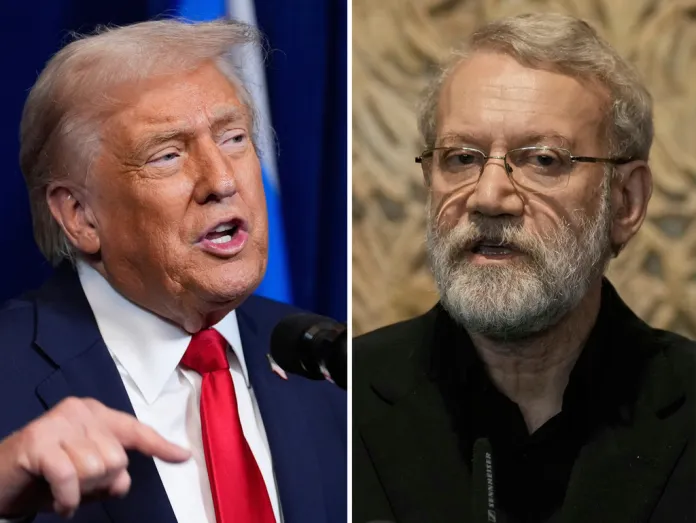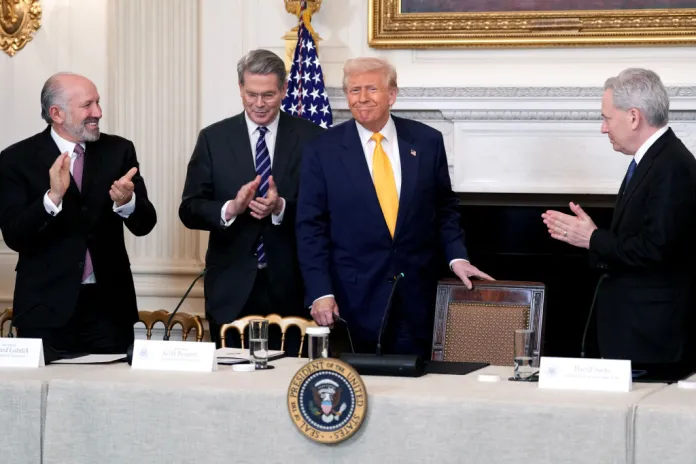Trump’s authority to declare tariffs ’emergency’ challenged in first court hearing – Washington Examiner
the article discusses a court hearing regarding president Donald trump’s tariff policy, which is being disputed by a group of small businesses. The hearing took place in the U.S. Court of International Trade, focusing on Trump’s assertion that he holds the authority to impose tariffs under the International Emergency Economic Powers Act (IEEPA). this act allows the president to declare a national emergency based on trade deficits, which Trump did, imposing blanket tariffs on imports.
The plaintiffs argue that Trump’s claims represent an overreach of executive power, suggesting that it allows the president to impose tariffs arbitrarily without meaningful judicial oversight. The court’s panel of judges expressed skepticism about whether the trade deficit constitutes a valid national emergency, asking for a clear legal standard for such emergencies.
The government’s attorney claimed that the tariffs are justified by the cumulative effects of a persistent trade deficit on the economy, while emphasizing that congressional review could address any presidential emergency declaration. Despite ongoing lawsuits challenging the tariffs, trump has also temporarily agreed to reduce tariffs in trade discussions with the UK and China.
Trump’s authority to declare tariffs ’emergency’ challenged in first court hearing
President Donald Trump‘s sweeping tariff policy faced its first full hearing in court on Tuesday after a group of small businesses challenged the president’s authority to issue the levies.
The hearing in the U.S. Court of International Trade was the first test of Trump’s claim that a law known as the International Emergency Economic Powers Act gives him the authority to issue the tariffs. Citing the “conditions reflected in large and persistent annual U.S. goods trade deficits,” Trump declared a national emergency last month under the IEEPA and announced 10% blanket tariffs on imports into the U.S., alongside higher “reciprocal” rates for select countries, before pausing the higher rates for 90 days a week after their announcement at the beginning of April.
The plaintiffs, a group of five small businesses affected by the tariffs, argued Trump’s rationale to levy the sweeping tariffs amounts to unchecked power. The court discussed motions for a preliminary injunction and for summary judgment during the hearing in New York.
Jeffrey Schwab, senior counsel and interim director of litigation at the Liberty Justice Center and lawyer for the plaintiffs, called Trump’s tariff plan “an unprecedented and unlawful expansion of executive authority.”
“The defendant’s position would allow the President to impose tariffs on any country at any rate, at any time, simply by declaring a national emergency without meaningful judicial review. This is not what Congress intended,” Schwab said during the hearing.
The panel of Judges Gary Katzmann, Timothy Reif, and Jane Restani appeared skeptical of the plaintiff’s arguments that the president’s tariffs did not constitute an emergency. Restani questioned Schwab what the standard for an emergency under IEEPA would be.
“You know it when you see it doesn’t work, so give me some words,” Restani said, later asking for a specific “legal standard.”
Schwab argued that the Trump administration’s emergency claims when invoking the tariffs is “so outside of what is normally considered an emergency or an unusual circumstance.”
The panel also appeared skeptical of the Justice Department’s arguments that a trade deficit constitutes an emergency under IEEPA, questioning if the trade deficit was the largest “that had ever existed.” Justice Department lawyer Eric Hamilton responded by noting the recent trend of the deficit rather than what the trade deficit was in individual years.
“The executive order notes is that in the last five years, the trade deficit has increased by 40% and it isn’t just the existence of a trade deficit that is justifying the declaration of a national emergency. Instead, it is the cumulative effects of the persistent trade deficit on the nation’s economy and the fact that the trade deficit has threatened the supply chain,” Hamilton said during the hearing.
Hamilton also argued that the president’s power under IEEPA is “beyond judicial review,” claiming that issues with the president’s emergency declaration are “for the political branches to resolve.”
He noted that Congress could reverse the emergency declaration through congressional review, mentioning when Congress ended the COVID-19 national emergency in 2023, and he pointed to a failed resolution to halt the tariffs by Congress last month.
US AND CHINA AGREE TO SLASH TARIFFS TEMPORARILY AS TRADE NEGOTIATION CONTINUES
The case heard Tuesday is one of several filed against the Trump administration seeking to block tariffs the president implemented last month. The first lawsuit was filed in the U.S. District Court for the Northern District of Florida against Trump’s tariffs on China, which were imposed earlier this year.
Since Trump announced the tariffs and the subsequent pause of the reciprocal tariffs, he has announced a new trade deal with the United Kingdom and a temporary agreement with China to relieve some tariffs. The lawsuits have continued despite the deals and pauses to the tariffs.
" Conservative News Daily does not always share or support the views and opinions expressed here; they are just those of the writer."




